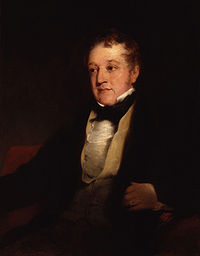William Huskisson
|
The Right Honourable William Huskisson |
|
|---|---|
 |
|
| President of the Board of Trade | |
|
In office 21 February 1823 – 3 September 1827 |
|
| Monarch | George IV |
| Prime Minister |
The Earl of Liverpool George Canning |
| Preceded by | Frederick John Robinson |
| Succeeded by | Charles Grant |
| Secretary of State for War and the Colonies | |
|
In office 3 September 1827 – 30 May 1828 |
|
| Monarch | George IV |
| Prime Minister |
The Viscount Goderich The Duke of Wellington |
| Preceded by | The Viscount Goderich |
| Succeeded by | Sir George Murray |
| Leader of the House of Commons | |
|
In office 3 September 1827 – 26 January 1828 |
|
| Monarch | George IV |
| Prime Minister | The Viscount Goderich |
| Preceded by | George Canning |
| Succeeded by | Robert Peel |
| Personal details | |
| Born |
11 March 1770 Birtsmorton Court, Malvern, Worcestershire |
| Died | 15 September 1830 (aged 60) Eccles, Lancashire |
| Nationality | British |
| Spouse(s) | Emily Milbanke (d. 1856) |
William Huskisson PC (11 March 1770 – 15 September 1830) was a British , financier, and Member of Parliament for several constituencies, including Liverpool.
He is best known as the world's first widely reported railway casualty as he was run over and fatally wounded by George Stephenson's pioneering locomotive engine Rocket.
Huskisson was born at Birtsmorton Court, Malvern, Worcestershire, the son of William and Elizabeth Huskisson, both members of Staffordshire families. He was one of four brothers. After their mother Elizabeth died, their father William eventually remarried and had further children by his second wife.
Huskisson was a student at Appleby Grammar School (later renamed Sir John Moore Church of England Primary School), a boarding school designed by Sir Christopher Wren on the Leicestershire/Derbyshire borders. In 1783, Huskisson was sent to Paris to live with his maternal great-uncle Dr. Richard Gem, who was physician to the British embassy there. He remained in Paris until 1792, and his experience as an eyewitness to the prelude and beginning of the French Revolution gave him a lifelong interest in politics. Huskisson first came to public notice while still in Paris. As a supporter of the moderate party, he became a member of the "Club of 1789," which favoured making France into a constitutional monarchy. On 29 August 1790, he delivered a speech entitled "Sur les Assignats", about the issue of assignats by the French government. This speech gave him a reputation as an expert in finance. From 1790 to 1792, the Marquess of Stafford was the British ambassador to Paris. Huskisson became a protégé of the Marquess, and returned to London with him.
...
Wikipedia
